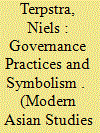| Srl | Item |
| 1 |
ID:
160169


|
|
|
|
|
| Summary/Abstract |
This article focuses on how the Liberation Tigers of Tamil Eelam (LTTE) insurgency performed de facto sovereignty and public authority in Northeastern Sri Lanka. It is situated within the wider academic debate on governance by state and non-state actors. We venture to unravel the complex linkages between the LTTE's governance practices and legitimation strategies by looking at narratives, performances, and inscriptions. While monopolizing the justice and policing sectors, in other sectors the LTTE operated pragmatically in conjunction with the state. The organization tried to generate and sustain public authority and legitimacy through a variety of violent and non-violent practices and symbols. It ‘mimicked’ statehood by deploying, among others, policing, uniforms, ceremonies, nationalist songs, commemorations of combatants, and the media. This not only consolidated its grip on the Northeast, but also engineered a level of support and compliance. We conclude that the LTTE's governance included practices that were created and carried out independently from the Sri Lankan state, while others took shape within a pre-existing political order and service provision by the state. The article elucidates the LTTE's mimicry of the state, as well as the operation of parallel structures and hybrid forms of state-LTTE collaboration. This facilitates a nuanced understanding of rebel governance beyond a simple state versus non-state binary.
|
|
|
|
|
|
|
|
|
|
|
|
|
|
|
|
| 2 |
ID:
190794


|
|
|
|
|
| Summary/Abstract |
This study explores the post-9/11 ramifications of the Global War on Terror (GWOT) in South Waziristan, Pakistan. It discusses how the post-colonial state has undermined state and tribal political relations which constituted political order first during the British colonial era and later in Pakistan. Furthermore, it explores how the post-colonial state has shared de facto sovereignty in the region with a “good” Taliban in the shape of a peace committee. To understand the Pakistan post-colonial state’s engagement with South Waziristan, it is necessary to make sense of the ongoing GWOT and the resulting necropolitics of life and death in South Waziristan. The paper explores how residents have confronted different scenarios when they encounter the new powerholders. It details the everyday experiences, life stories, and socio-political existence of the people of South Waziristan as an alternative narrative to how mainstream media and academic sources have discussed this area.
|
|
|
|
|
|
|
|
|
|
|
|
|
|
|
|